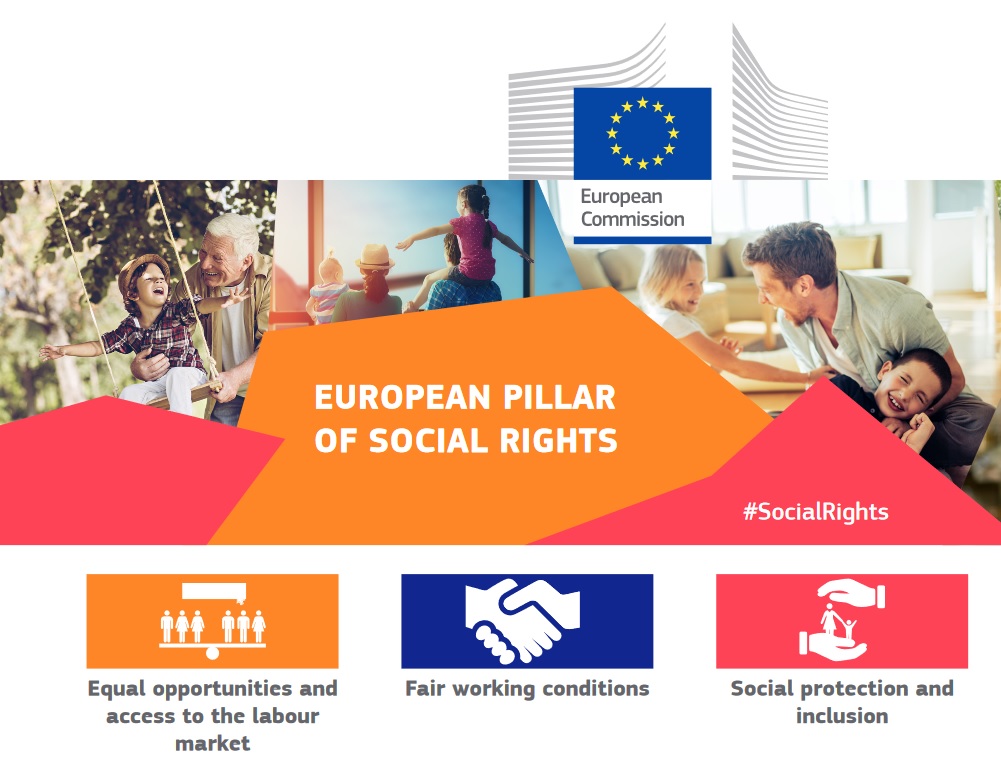European Union, don’t go away: the Social Pillar Prescription
For way too long European Union has been on “trial”. The crisis which has been affected our home since 2008, finally seems giving Europe time to breath; however, the sense of disaffection is truly a common feeling that mostly Europeans share. If the idea of building Europe born in order to put all Member States together to be stronger and from the profound sense of a bigger inclusive society where nobody is left behind, where also economic, social and cultural rights represent the lifeblood to a growing and a heathy community; today that beautiful construction seems tremble; the upper bricks are crumbling and the mortar, which tied us, is melting. Populism, Brexit, domino effect, financial crisis, national states against the EU, social injustice, illegal migrations: all these expressions are going to occupy all the empty spaces left between the bricks. As matter of a fact, nevertheless, the employment rate is increasing, not all Member States are in the same situation: “divergences across euro area countries in terms of GDP per capita and unemployment rates persist. The rates of long-term unemployment and youth unemployment are still high while poverty, social exclusion and inequality remain a serious concern in several Member States”.

How to rebuild the old dream when it seems falling apart? The virus has taken the patient and maybe the cure no longer exists or it could be not strong enough. However, what doctor might prescript?
A few months ago, in a sunny day in Leuven, interesting remarks were made about a new book entitled “A European Union after the Crisis” edited by Frank Vandenbroucke, Catherine Barnard and Geert de Baere. The book highlights which steps we should take toward a Union that cares about higher education, equal opportunities, higher quality standards for alimentation and health care, a welfare state typical of Member States needs. Since the economic crisis, Europe might have missed to take care of the last men: the poorest, the unemployed, the youngest, the elderly, the students. However, when such crisis take place, Europe must act to embrace the Europeans, to be their home and not falling apart with only austerity policies as yardstick put in place to regulate. In the middle of the storm, constructing a EU social dimension is linked to a latest answer which is called “European Pillar of Social Rights” proclaimed by the European Parliament, Council and Commission at the Social Summit for Fair Jobs and Growth (Gothenburg, 17 November 2017). “The Pillar consists of principles and rights supporting fair and well-functioning labour markets and welfare systems” because today we must state that “European social Union is not a luxury, but a necessity. It is a necessity to let the European Monetary Union and the Single Market function well” (Frank Vandenbroucke).
Therefore, we should find a Europe which is not anymore, the boss, but the leader; a Europe whose recommendations are closer to the Member States needs, a Europe which represents a guide to inspire a “collection of different welfare states. In this perspective, the European Social Union has the function of creating an environment which allows the different welfare states to flourish. For instance, at EU-level general social standards and objectives could be developed, while leaving questions on its implementation to the national level”. Hence, flexibility, in a transparent and efficient multi-level governance, is the new key role to reach a better balance between cost-effectiveness, a more productive labour market at national level with a fair and dynamic economic and last, more coherence on the social policy-making area.
Such concern for the social dimension has affected also the way of thinking to the economic aspect. Indeed, the European Commission has promoted the 2018 Recommendations, to the Council, on the economic policy of the euro area. It is a message for implementing reforms about, for instance, economic recovery “by supporting aggregate demand, reduces inequalities and ensures high standards of living in the area” considered the country-specific conditions. Also, at 5 paragraph we find the necessity to “balance in the overall macroeconomic policy mix of the euro area, including monetary, fiscal and structural policies, is crucial to ensure a more robust and sustainable economic recovery”. Besides, “well-functioning labor markets and social protection systems are important foundations for inclusive economic growth, for reduced inequality and for the resilience of national economies and the euro area as a whole”, and not to mention, the importance to “access to high quality education and training is vital to ensure equal opportunities and address skills mismatches”.
Putting social principles and rights first could really give another chance to Europe, becoming indeed, a trigger for a new European Action Plan or Social Agenda (J.C Junker). In doing so a politicization of Social Pillar could lead to the possibility of reaching meaningful goals overcoming the hypothetical political conflicts which could arise between the supranational and national level such as “pooling of sovereignty, national identity and the issue of solidarity among Member States”.
Time will tell if a bunch of principles negotiated by the European Parliament, the European Commission and the Council together, will help the European citizens to feel part of a huge community where equality, efficiency, productivity, protection and inclusion might create a better and a healthier society or, on the contrary, if political conflicts between Member States will overcame every step toward the idea of the EU forefathers.
By: Deborah Ceccarello
Visits: 271

